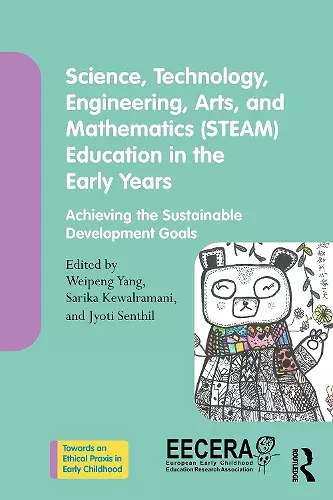Science, Technology, Engineering, Arts, and Mathematics (STEAM) Education in the Early Years
Achieving the Sustainable Development Goals
Weipeng Yang editor Sarika Kewalramani editor Jyoti Senthil editor
Format:Paperback
Publisher:Taylor & Francis Ltd
Published:5th Dec '23
Currently unavailable, and unfortunately no date known when it will be back
This paperback is available in another edition too:
- Hardback£145.00(9781032405698)

This book provides a fresh perspective on recent debates around integrating STEAM (Science, Technology, Engineering, Arts, and Mathematics) education in early childhood.
The book offers inspiration and practical advice for educators and researchers. It suggests concrete ways to engage young children in STEAM learning activities and promote their development. With contributions from international experts, the book discusses how to develop age-appropriate STEAM learning activities for young children. Divided into four parts, the book covers a wide range of topics, including the perceptions and practices of STEAM education among early childhood teachers in different countries, the use of new pedagogies and technologies to promote equitable and accessible STEAM education, the role of teacher education and policy in reducing inequality in STEAM education, and how early STEAM education can promote social change and achieve sustainable development goals. The book highlights the importance of STEAM education in providing young children with the necessary skills to create a more sustainable and equitable world. Overall, this book provides an important contribution to help critique and improve how early childhood educators view and practice STEAM education across cultures. It proposes ideas for achieving sustainable development goals through high-quality early STEAM education.
The book appeals to early childhood educators and researchers, as it draws on cross-cultural viewpoints to critically examine how teachers understand and implement STEAM education across different cultures along with exploring how cultural values and goals shape early STEAM education.
Andreas Schleicher – Director for the Directorate of Education and Skills, OECD
Children are born as STEM experts, they love understanding nature, to try things out and test ideas, and to figure out cause and effect. But as they grow older, many turn away from this early love, experiencing the STEM subjects in school as an abstract world of formulas and equations that is unrelated to their lives and dreams, quickly memorised and then forgotten. Yang, Kewalramani and Senthil show how we can turn this around, teaching STEM in the early years in ways that build curiosity, agency and a science-based world view. This is not just about the next generation of engineers, it is about citizens who share an evidence-based reality and who take responsible decisions for themselves, for others and for the planet.
Philip Hui Li – Chair Professor and Dean of Shanghai Institute of Early Childhood Education, Shanghai Normal University, China
This book provides a comprehensive overview of the cutting-edge state of STEAM education in early childhood settings with practical examples and effective strategies. It covers a wide range of topics, including teacher perceptions and practices, the role of new pedagogies and technologies, equity and inclusion, teacher education and policy, and achieving sustainable development goals. The diverse global perspectives and enriched international experiences make this book an essential read for anyone interested in promoting STEAM education for young children. The editors, Weipeng Yang, Sarika Kewalramani, and Jyoti Senthil, have brought together an incredible group of contributors to create a timely and valuable resource for educators, policymakers, and researchers alike.
Coral Campbell – Professor of Science Education, Deakin University, Australia
In recent years, two very strong focuses have emerged that impact the world – the need for STEM capabilities and the development of sustainable futures. If we are to have a prosperous, equitable future, we need to cultivate a futures-oriented approach to learning that involves young children. In the area of early childhood education, STEAM education has been expanding to provide young children with a means to contribute as active participants in their learning. Children also have a role in sustaining a viable environmental future. Young children will need to manage the sustainability issues of the future, with STEAM skills and knowledge. This book is a valuable contribution to the field as it successfully brings together recent relevant research from across the globe. Using a structured approach to identify the issues and successes in STEAM education for sustainability, this book is a ‘must read’ for any early childhood professional educator and researcher who seeks to understand the complexities underpinning a sustainability approach to STEAM teaching and learning. It is a significant contribution to the field.
Professor Susanne Garvis, Griffith University
This book draws together 16 chapters from around the world to explore different perspectives, theories and practices useful for early childhood education practitioners and researchers. The alignment with the Sustainable Development Goals shows the importance of creating high quality learning experiences with young children to support successful equitable and sustainable futures for all. A focus on future orientation provides opportunities for teachers and policy makers to rethink what is possible and allow strong connections between theory and pedagogical practices.
ISBN: 9781032405681
Dimensions: unknown
Weight: 700g
268 pages